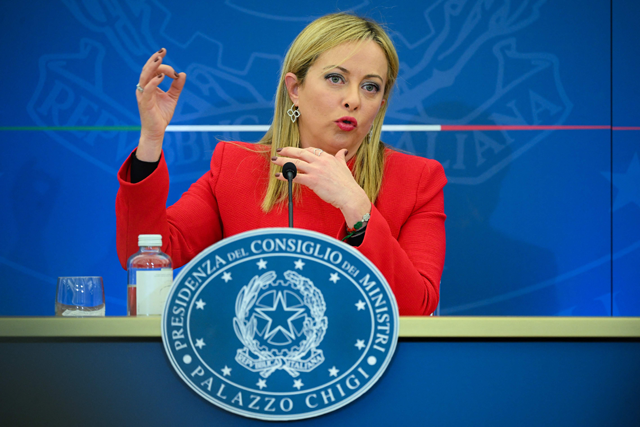You are here
Bank tax hits investor confidence in Italian gov't
By AFP - Aug 13,2023 - Last updated at Aug 13,2023
MILAN — Italian Prime Minister Giorgia Meloni's government watered down its surprise windfall tax on banks this week after a brutal market reaction, but the damage to investor confidence was done.
"The most damaging impact... will not be the hit to the earnings of Italian banks but the higher risk premium that investors will demand to compensate them for the risk of future government intervention," noted Johann Scholtz, analyst at Morningstar.
Meloni's hard-right government announced out of the blue on Monday night that it would levy a 40-per cent tax on banks' "surplus profits" generated by interest rate hikes, due to last one year.
Shares in Italian banks plunged the next day on the Milan exchange, losing 9.5 billion euros ($10.5 billion) in capitalisation — a figure well in excess of the money Rome had hoped to raise from the tax.
That evening, the government announced the levy would be capped at 0.1 per cent of the total assets of a bank, causing them to recover some of their lost ground in trading on Wednesday and Thursday.
But ratings agency Moody's said on Thursday that the one-off tax would "lower profits systemwide and significantly reduce the benefit of increased interest rates to the sector".
Parliament must still approve the decree law but if implemented in its current form, the levy would represent "about 15 per cent" of Italian banks' net income in 2022, it said.
'Haphazard manner'
It was Meloni's first showdown with the markets since she took office in October, after her far-right Brothers of Italy Party came top in September's general election.
Initial alarm at the potential for radical change in the eurozone's third-largest economy gave way to relief as Meloni mostly followed the path set by her predecessor, former European Central Bank chief Mario Draghi.
One of Draghi's ministers, Giancarlo Giorgetti of the far-right League party, stayed on as Meloni's economy minister.
He reassured banks in June that a windfall tax was not on the cards — but was absent on Monday when the measure was unveiled by League leader Matteo Salvini.
"An economy minister who does not show up for a press conference in such an occasion gives a very bad image of the country," noted Francesco Giavazzi, a former economic advisor to Draghi.
"The haphazard manner of the announcement, where the government changed the terms of the tax at least three times in one day, will do little to restore investor confidence," added Scholtz.
'Populist target'
While Meloni left the announcement of the tax to Salvini, her deputy prime minister, she defended it in a video posted on social media on Wednesday.
She criticised the "unfair margins" of the banks, and said the money raised would help "fund measures of support for households and businesses" struggling with record inflation.
Italian banks, like their European counterparts, saw their net interest income soar in the wake of the European Central Bank's rise in interest rates.
According to the Italian media, Meloni agreed with Salvini to introduce the measure to help appease their right-wing electorate.
The government — which also includes the Forza Italia party of late former premier Silvio Berlusconi — has been criticised for cutting an anti-poverty mechanism and blocking opposition calls for a minimum wage.
"Banks are an easy populist target and their bashing can only attract political support," said Lorenzo Codogno, former chief economist at the Italian Treasury.
But he warned that "a Soviet-style tax" such as this week's levy "risks producing permanent damage to the attractiveness of Italy's economy".
Related Articles
MILAN — Italy's right-wing government has unveiled a surprise 40 per cent windfall tax on "surplus profits" generated by the rise in interes
ROME — Italy's new far-right government unveiled its first budget on Tuesday, with most of the nearly 35 billion euros in spending for 2023
ROME — Far-right leader Giorgia Meloni said Monday she was ready to govern for "all Italians" after her eurosceptic populists swept to victo













